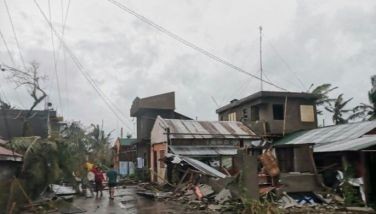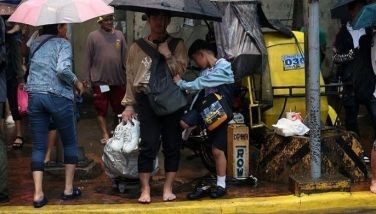Massive rainforest replanting plan up
November 21, 2005 | 12:00am
Various pro-environment and non-government organizations have launched a national movement to restore at least one million hectares of the country’s rainforest by 2020.
They raised the alarm over the continuing rapid rate of destruction of the country’s forests, which they predicted may dwindle to a mere 320,000 hectares of primary forest, or a measly six percent of the country’s total land area, by 2010.
"The forest is our social security system. We owe it protection for the free forest benefits and ecosystem services it provides," said Prof. Blas Tabaranza, director of Haribon Foundation, which recently turned over to legislators, local government units, and the Department of Environment and Natural Resources (DENR) at least one million signatures against logging and mining especially in natural forests.
The Haribon Foundation and Rainforest Restoration Initiative (RFRI) would serve as the core group of the social movement, dubbed as ROAD 2020, which would be supported by the Netherlands.
"The national movement for rainforestation is not just about planting individual trees," said Dr. Edwino Fernando of RFRI. "It is (also) about bringing back the rainforest."
"In this way, the amazing diversity of forest life survives, there is clean water and abundant food, soil erosion is minimized, among many other ecological services. It is guided by the reality of the need to protect the natural forest and to ensure there is also a production component for the livelihood of communities," he added.
According to Tabaranza, the target of one million hectares of restored forests would support viable populations of native tree species and other plants, birds, mammals, reptiles, amphibians and insects throughout their natural range.
The ROAD 2020 would only use native tree species.
"Like in a bank account, I think it’s abut time that we now stop the ‘withdrawal’ and just ‘deposit’ and really ‘save up’ this time so that we would still be able to get something in the future, and provide something for our children," Tabaranza said.
Haribon data showed that in 1899, the country’s forest cover was estimated at 21 million hectares, or 70 percent of the country’s total land area.
But in less than a century, the country’s natural forests were reduced to six million hectares in 1988, with Luzon having 49.49 percent, Visayas 10.08 percent, and Mindanao 40.43 percent.
A decade later, Haribon said, the country’s forest cover was further reduced to only 800,000 hectares, or 18 percent of the country’s total land area.
Based on Haribon’s Policy Paper No. 2, the significant reduction of the country’s forest cover to its barest minimum was due to deforestation and degradation activities such as persistent logging and kaingin or slash-and-burn farming, among other factors, in the last several decades.
It said the entire forest landscape of the archipelago has been radically altered.
The Haribon also said that most of the remaining natural forests in the country are now small and fragmented because they long ago reached the threshold of sustainability.
"Notwithstanding that these forests hold about 81 percent of our Important Bird Areas, they are virtually neglected by both the local and national governments," Haribon said.
"Worse, our deforestation rate continues to soar higher. As a gross consequence, ecological and economic disasters have now become inevitable," it added.
The DENR has listed around 38,000 areas nationwide which are considered prone to frequent landslides and flooding. Most of these areas are located in the heavily denuded forest areas of the country.
They raised the alarm over the continuing rapid rate of destruction of the country’s forests, which they predicted may dwindle to a mere 320,000 hectares of primary forest, or a measly six percent of the country’s total land area, by 2010.
"The forest is our social security system. We owe it protection for the free forest benefits and ecosystem services it provides," said Prof. Blas Tabaranza, director of Haribon Foundation, which recently turned over to legislators, local government units, and the Department of Environment and Natural Resources (DENR) at least one million signatures against logging and mining especially in natural forests.
The Haribon Foundation and Rainforest Restoration Initiative (RFRI) would serve as the core group of the social movement, dubbed as ROAD 2020, which would be supported by the Netherlands.
"The national movement for rainforestation is not just about planting individual trees," said Dr. Edwino Fernando of RFRI. "It is (also) about bringing back the rainforest."
"In this way, the amazing diversity of forest life survives, there is clean water and abundant food, soil erosion is minimized, among many other ecological services. It is guided by the reality of the need to protect the natural forest and to ensure there is also a production component for the livelihood of communities," he added.
According to Tabaranza, the target of one million hectares of restored forests would support viable populations of native tree species and other plants, birds, mammals, reptiles, amphibians and insects throughout their natural range.
The ROAD 2020 would only use native tree species.
"Like in a bank account, I think it’s abut time that we now stop the ‘withdrawal’ and just ‘deposit’ and really ‘save up’ this time so that we would still be able to get something in the future, and provide something for our children," Tabaranza said.
Haribon data showed that in 1899, the country’s forest cover was estimated at 21 million hectares, or 70 percent of the country’s total land area.
But in less than a century, the country’s natural forests were reduced to six million hectares in 1988, with Luzon having 49.49 percent, Visayas 10.08 percent, and Mindanao 40.43 percent.
A decade later, Haribon said, the country’s forest cover was further reduced to only 800,000 hectares, or 18 percent of the country’s total land area.
Based on Haribon’s Policy Paper No. 2, the significant reduction of the country’s forest cover to its barest minimum was due to deforestation and degradation activities such as persistent logging and kaingin or slash-and-burn farming, among other factors, in the last several decades.
It said the entire forest landscape of the archipelago has been radically altered.
The Haribon also said that most of the remaining natural forests in the country are now small and fragmented because they long ago reached the threshold of sustainability.
"Notwithstanding that these forests hold about 81 percent of our Important Bird Areas, they are virtually neglected by both the local and national governments," Haribon said.
"Worse, our deforestation rate continues to soar higher. As a gross consequence, ecological and economic disasters have now become inevitable," it added.
The DENR has listed around 38,000 areas nationwide which are considered prone to frequent landslides and flooding. Most of these areas are located in the heavily denuded forest areas of the country.
BrandSpace Articles
<
>
- Latest
- Trending
Trending
Latest
Trending
Latest
Recommended




























